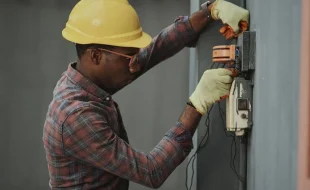Table Of Contents
- 1. Assess the Vulnerabilities
- 2. Access Control
- a. Key Card Systems
- b. Biometric Access
- 3. Security Personnel
- 4. Surveillance Cameras
- 5. Alarm Systems
- 6. Secure Entrances and Exits
- 7. Lighting
- 8. Secure Data and Information
- 9. Employee Training
- 10. Visitor Management
- 11. Regular Inspections and Maintenance
- 12. Emergency Preparedness
- 13. Environmental Considerations
- 14. Vendor Security
- 15. Security Audits
- 16. Legal Compliance
- 17. Budget Planning
- 18. Security Culture
- Frequently Asked Questions (FAQs)
- Conclusion
Securing Your Commercial Property: Essential Measures For Facility Managers
Last Updated on: November 14th, 2024
When you’re responsible for managing a commercial property, one of your top priorities is ensuring its security. From safeguarding the physical assets to protecting the people who work or visit the premises, a comprehensive security strategy is a must.
In this blog post, we’ll explore essential measures that facility managers should consider when it comes to securing their commercial properties.
1. Assess the Vulnerabilities
Before implementing any security measures, it’s crucial to conduct a thorough assessment of your property’s vulnerabilities. Consider factors such as location, size, and layout.
Are there blind spots or easy points of access for unauthorized individuals? Identifying these weaknesses is the first step in crafting an effective security plan. It’ll also help you determine what products you need, from access panels to access control.
2. Access Control
a. Key Card Systems
Implementing a key card access system can greatly enhance security. This technology allows you to track who enters and exits the building, restricting access to authorized personnel only.
b. Biometric Access
For higher security requirements, consider incorporating biometric access controls, such as fingerprint or retina scans. These systems offer unparalleled accuracy in verifying identity.
3. Security Personnel
Having trained security personnel on-site can be a significant deterrent to potential threats. Whether it’s security guards, concierge services, or both, their presence can help prevent incidents and ensure a swift response in emergencies.
4. Surveillance Cameras
Strategically placed surveillance cameras can provide invaluable insights into your property’s security. Modern systems offer features like high-definition video quality, night vision, and remote access for real-time monitoring.
5. Alarm Systems
Invest in a reliable alarm system that can alert you and the authorities in the event of unauthorized access, fire, or other emergencies. Regularly test and maintain these systems to ensure they function correctly.
6. Secure Entrances and Exits
Strengthen access points with sturdy doors, locks, and reinforced windows. Consider installing anti-ram barriers at entrances to protect against vehicle-based attacks.
7. Lighting
Well-lit areas are less inviting to criminals. Install adequate lighting both inside and outside your property, paying special attention to parking lots and dark corners.
8. Secure Data and Information
In today’s digital age, data security is just as crucial as physical security. Encrypt sensitive data, use strong passwords, and regularly update your cybersecurity protocols.
9. Employee Training
Educate your staff on security procedures and emergency protocols. Conduct regular drills to ensure everyone knows how to respond in various situations.
Related: The Importance Of Training In A Company: Enhancing Employee Skills And Boosting Performance
10. Visitor Management
Implement a visitor management system to track and control who enters your property. Require all visitors to sign in and provide identification.
11. Regular Inspections and Maintenance
Don’t neglect routine inspections and maintenance of your security systems. Address any issues promptly to ensure everything is in working order.
12. Emergency Preparedness
Create a comprehensive emergency plan that includes evacuation procedures, emergency contacts, and communication protocols. Regularly review and update this plan with input from key stakeholders.
13. Environmental Considerations
Protect your property from environmental threats like floods, fires, and extreme weather events. Install appropriate sensors and systems to mitigate these risks.
14. Vendor Security
Ensure that any vendors or contractors who have access to your property adhere to your security standards. Conduct background checks when necessary.
15. Security Audits
Periodically assess the effectiveness of your security measures through security audits. Identify areas for improvement and make necessary adjustments.
16. Legal Compliance
Stay informed about local laws and regulations regarding commercial property security. Comply with all legal requirements to avoid potential liabilities.
17. Budget Planning
Allocate a portion of your budget specifically for security measures. While it may seem like an expense, consider it an investment in safeguarding your property and its occupants.
18. Security Culture
Promote a culture of security among your staff and tenants. Encourage everyone to be vigilant and report any suspicious activity.
Frequently Asked Questions (FAQs)
Q1: Do I need to invest in the latest security technology for my property?
A1: Not necessarily. The level of security technology you require should be based on your property’s specific needs and vulnerabilities. It’s important to strike a balance between effective security and budget considerations.
Q2: How often should security drills be conducted?
A2: It’s advisable to conduct security drills at least twice a year. However, more frequent drills may be necessary for high-risk properties or areas prone to specific threats.
Q3: Can I handle security on my own, or should I hire a security company?
A3: While some property managers may handle security in-house, hiring a professional security company can provide expertise and round-the-clock coverage, often proving to be more effective and efficient.
Conclusion
Securing your commercial property is an ongoing process that requires careful planning and execution. By assessing vulnerabilities, implementing access controls, and staying proactive, you can create a safe and secure environment for your property, its occupants, and your peace of mind.
Remember that a well-executed security strategy not only protects your assets but also enhances the overall value of your commercial property. So, don’t wait—start securing your property today!
Read Also:














